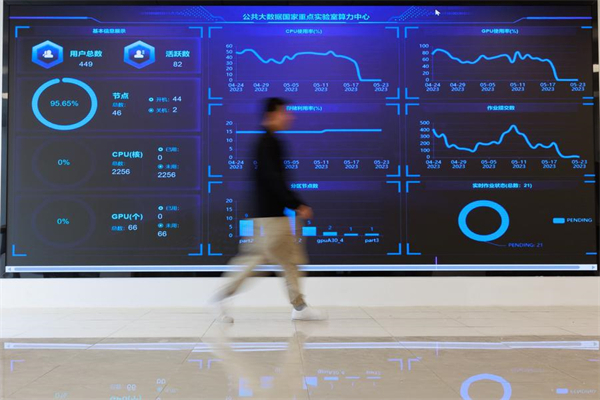
- Home
- Media Center
-
Events
- Wuzhen Summit
- Regional Forums
- Practice Cases of Jointly Building a Community with a Shared Future in Cyberspace
- World Internet Conference Awards for Pioneering Science and Technology
- The Light of Internet Expo
- Straight to Wuzhen Competition
- Global Youth Leadership Program
- WIC Distinguished Contribution Award
- Membership
- Research & Cooperation
- Digital Academy
-
Reports
- Collection of cases on Jointly Building a Community with a Shared Future in Cyberspace
- Collection of Shortlisted Achievements of World Internet Conference Awards for Pioneering Science and Technology
- Reports on Artificial Intelligence
- Reports on Cross — Border Ecommerce
- Reports on Data
- Outcomes of Think Tank Cooperation Program
- Series on Sovereignty in Cyberspace Theory and Practice
- Other Achievements
- About WIC
- 中文 | EN

Advantages must be made the most of to develop AI

A staff member walks past a screen at the State Key Laboratory of Public Big Data at Guizhou University in Guiyang, Southwest China's Guizhou province, May 23, 2023. [Photo/Xinhua]
The central authorities have recently required State-owned enterprises to accelerate the construction of a number of intelligent computing centers, better leverage the role of collaborative innovation platforms, carry out artificial intelligence+ special actions, and accelerate emerging technologies' empowerment of key industries.
The move is aimed at driving the deep integration of the digital economy and the real economy and empowering industrial upgrading through the application of AI technology. It is mainly to use the advantages of data resources and application scenarios brought by the deep digitalization of China's economy and market scale to empower industrial upgrading and comprehensively improve economic efficiency.
US companies mainly use public data and invest in general large language models to achieve high-quality information integration, translation, video or text creation, problem-solving and planning.
Chinese internet companies have also launched a series of large model products. Unlike US capital, which is keen to invest in AI, Chinese internet companies or venture capital often have a strong adherence to "business model innovation" thinking. That is, if the technology does not have a mature or predictable business application model, they are unwilling to gamble on it, as they would rather become a follower rather than take the winner-or-loser risks.
That means Chinese internet companies are strong in business model innovation, while AI requires strong basic research and technology development capabilities, and large-scale application is a later task. This has resulted in the certain weakness of Chinese companies in the development of large AI models.
China must see its weakness compared with the US, particularly its lack of creative high-end technology leaders and its lack of basic theory and original algorithm capabilities. With the restrictions on China's access to the most advanced AI chips, the gap in computing power between China and the US may further widen.
All these problems need addressing, to give China's advantages real meanings in its pursuit to become a major AI innovation center.

The World Internet Conference (WIC) was established as an international organization on July 12, 2022, headquartered in Beijing, China. It was jointly initiated by Global System for Mobile Communication Association (GSMA), National Computer Network Emergency Response Technical Team/Coordination Center of China (CNCERT), China Internet Network Information Center (CNNIC), Alibaba Group, Tencent, and Zhijiang Lab.





